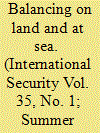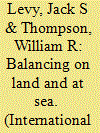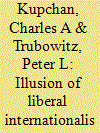|
|
|
Sort Order |
|
|
|
Items / Page
|
|
|
|
|
|
|
| Srl | Item |
| 1 |
ID:
097752


|
|
|
|
|
| Summary/Abstract |
Scholars often interpret balance of power theory to imply that great powers almost always balance against the leading power in the system, and they conclude that the absence of a counterbalancing coalition against the historically unprecedented power of the United States after the end of the Cold War is a puzzle for balance of power theory. They are wrong on both counts. Balance of power theory is not universally applicable. Its core propositions about balancing strategies and the absence of sustained hegemonies apply to the European system and perhaps to some other autonomous continental systems but not to the global maritime system. Sea powers are more interested in access to markets than in territorial aggrandizement against other great powers. Consequently, patterns of coalition formation have been different in the European system and in the global maritime system during the last five centuries. An empirical analysis demonstrates that counterhegemonic balancing is frequent in Europe but much less frequent in the global system. Higher concentrations of power in the global system lead to fewer and smaller rather than more frequent and larger balancing coalitions, as well as to more frequent and larger alliances with the leading sea power than against it.
|
|
|
|
|
|
|
|
|
|
|
|
|
|
|
|
| 2 |
ID:
097753


|
|
|
|
|
| Publication |
2010.
|
| Summary/Abstract |
Scholars often interpret balance of power theory to imply that great powers almost always balance against the leading power in the system, and they conclude that the absence of a counterbalancing coalition against the historically unprecedented power of the United States after the end of the Cold War is a puzzle for balance of power theory. They are wrong on both counts. Balance of power theory is not universally applicable. Its core propositions about balancing strategies and the absence of sustained hegemonies apply to the European system and perhaps to some other autonomous continental systems but not to the global maritime system. Sea powers are more interested in access to markets than in territorial aggrandizement against other great powers. Consequently, patterns of coalition formation have been different in the European system and in the global maritime system during the last five centuries. An empirical analysis demonstrates that counterhegemonic balancing is frequent in Europe but much less frequent in the global system. Higher concentrations of power in the global system lead to fewer and smaller rather than more frequent and larger balancing coalitions, as well as to more frequent and larger alliances with the leading sea power than against it.
|
|
|
|
|
|
|
|
|
|
|
|
|
|
|
|
| 3 |
ID:
097755


|
|
|
|
|
| Publication |
2010.
|
| Summary/Abstract |
Recent research, including an article by Charles Kupchan and Peter Trubowitz in this journal, has argued that the United States' long-standing foreign policy orientation of liberal internationalism has been in serious decline because of rising domestic partisan divisions. A reanalysis of the theoretical logic driving these arguments and the empirical evidence used to support them suggests a different conclusion. Extant evidence on congressional roll call voting and public opinion surveys, which is often used to support the claim that liberal internationalism has declined, as well as new evidence about partisan divisions in Congress using policy gridlock and cosponsorship data from other studies of American politics do not demonstrate the decline in bipartisanship in foreign policy that conventional wisdom suggests. The data also do not show evidence of a Vietnam War or a post-Cold War effect on domestic partisan divisions on foreign policy. Contrary to the claims of recent literature, the data show that growing domestic political divisions over foreign policy have not made liberal internationalism impossible. It persists as a possible grand strategy for the United States in part because of globalization pressures.
|
|
|
|
|
|
|
|
|
|
|
|
|
|
|
|
| 4 |
ID:
097758


|
|
|
|
|
| Publication |
2010.
|
| Summary/Abstract |
Positive inducements as a strategy for dealing with regimes that challenge core norms of international behavior and the national interests of the United States ("renegade regimes") contain both promises and pitfalls. Such inducements, which include policy concessions and economic favors, can serve two main purposes: (1) arranging a beneficial quid pro quo with the other side, and (2) catalyzing, via positive engagement, a restructuring of interests and preferences within the other side's politico-economic system (such that quid pro quos become less and less necessary). The conditions for progress toward either purpose can vary, as can the requirements for sufficient and credible concessions on both sides and the obstacles in the way of such concessions. For renegade regimes, a primary consideration involves the domestic purposes that internationally objectionable behavior can serve. An examination of the cases of North Korea, Iran, and Libya finds that negative pressures have been relatively ineffective, suggesting that more attention should be given to the potential for positive inducements to produce better outcomes.
|
|
|
|
|
|
|
|
|
|
|
|
|
|
|
|
| 5 |
ID:
097756


|
|
|
|
|
| Publication |
2010.
|
| Summary/Abstract |
Over the past two decades, political polarization has shaken the domestic foundations of U.S. grand strategy, sorely testing bipartisan support for liberal internationalism. Stephen Chaudoin, Helen Milner, and Dustin Tingley take issue with this interpretation, contending that liberal internationalism in the United States is alive and well. Their arguments, however, do not stand up to careful scrutiny. Their analysis of congressional voting and public opinion fails to demonstrate the persistence of bipartisanship on foreign policy. Indeed, the partisan gap that widened during George W. Bush's administration has continued during the presidency of Barack Obama, confirming that a structural change has taken place in the domestic bases of U.S. foreign policy. President Obama now faces the unenviable challenge of conducting U.S. statecraft during an era when consensus will be as elusive at home as it is globally.
|
|
|
|
|
|
|
|
|
|
|
|
|
|
|
|
| 6 |
ID:
097757


|
|
|
|
|
| Publication |
2010.
|
| Summary/Abstract |
Washington and Bonn pursued a shared strategy of perpetuating U.S. preeminence in European security after the end of the Cold War. As multilingual evidence shows, they did so primarily by shielding the North Atlantic Treaty Organization (NATO) from potential competitors during an era of dramatic change in Europe. In particular, the United States and West Germany made skillful use in 1990 of Soviet leader Mikhail Gorbachev's political weakness and his willingness to prioritize his country's financial woes over security concerns. Washington and Bonn decided "to bribe the Soviets out," as then Deputy National Security Adviser Robert Gates phrased it, and to move NATO eastward. The goal was to establish NATO as the main post-Cold War security institution before alternative structures could arise and potentially diminish U.S. influence. Admirers of a muscular U.S. foreign policy and of NATO will view this strategy as sound; critics will note that it alienated Russia and made NATO's later expansion possible. Either way, this finding challenges the scholarly view that the United States sought to integrate its former superpower enemy into postconflict structures after the end of the Cold War.
|
|
|
|
|
|
|
|
|
|
|
|
|
|
|
|
| 7 |
ID:
097754


|
|
|
|
|
| Publication |
2010.
|
| Summary/Abstract |
Speculation about the future of the North Korean regime has been intense for nearly two decades. In the 1990s, economic crises and famine led to predictions of the Kim regime's imminent downfall. Today analysts highlight impending famine as well as threats to the regime's position brought by eroding information control. Several theories of authoritarian control help to explain how Kim Jong-il and his family have remained in power and how this might change over time. The Kim regime has employed a variety of authoritarian "tools" to protect itself both from popular revolt and from internal coups. Its social policies, reliance on certain ideas and nationalism, and use of force prevent the onset of revolution. Through numerous other tools (elite co-optation, manipulation of foreign governments for financial aid, and the "coupproofing" of domestic institutions), the regime protects itself from coups d'état and elite unrest. This framework not only helps to explain the past resilience of the regime, but it suggests that the regime is not in danger of being unseated by coups or revolution. Yet it also suggests that the regime has not adequately prepared for succession after Kim's death. This analysis has implications for policy planning about the future of the Korean Peninsula, as well as for negotiations with and coercive strategies toward Pyongyang.
|
|
|
|
|
|
|
|
|
|
|
|
|
|
|
|
|
|
|
|
|